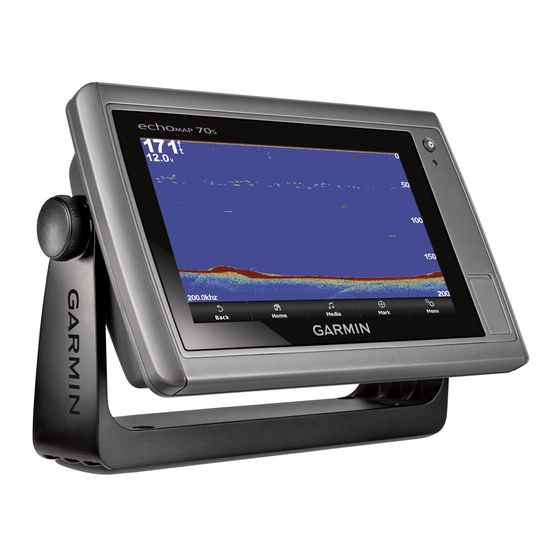Auto Guidance: Creates a path to a destination using Auto
Guidance. This option is available only when using a
compatible premium chart in a compatible chartplotter. It
provides a turn-by-turn navigation line to the destination,
avoiding land and other obstacles. The navigation line is
based on the chart data and the safe depth, safe height, and
shoreline distance user-defined chartplotter settings. Using
these settings and chart data, the chartplotter creates a
navigation line that avoids all areas that cannot be navigated
between the present location and the destination.
When you are using a compatible Garmin autopilot
connected to the chartplotter using NMEA 2000
autopilot follows the Auto Guidance route.
Basic Navigation Questions
Question
How do I make the chartplotter
point me in the direction in
which I want to go (bearing)?
How do I make the device
guide me along a straight line
(minimizing cross track) to a
location using the shortest
distance from the present
location?
How do I make the device
guide me to a location while
avoiding charted obstacles?
How do I make the device
steer my automatic pilot?
Can the device create a path
for me?
How do I change the Auto
Guidance settings for my boat?
Destinations
You can select destinations using various charts and 3D chart
views or using the lists.
Searching for a Destination by Name
You can search for saved waypoints, saved routes, saved
tracks, and marine services destinations by name.
1
Select Nav Info > Search by Name.
2
Enter at least a portion of the name of your destination.
3
If necessary, select Done.
The 50 nearest destinations that contain your search criteria
appear.
4
Select the destination.
Selecting a Destination Using the Navigation Chart
From the Navigation chart, select a destination.
Searching for a Marine Services Destination
NOTE: This feature is available with premium charts, in some
areas.
The chartplotter contains information for thousands of
destinations offering marine services.
1
Select Nav Info.
2
Select Offshore Services or Inland Services.
3
If necessary, select the marine service category.
The chartplotter shows a list of the nearest locations and the
distance and bearing to each.
Navigation with a Chartplotter
, the
®
Answer
Navigate using Go To. See
Setting
and Following a Direct Course Using
Go
To.
Build a single-leg route and navigate it
using Route To. See
Creating and
Navigating a Route From Your Present
Location.
Build a multi-leg route and navigate it
using Route To. See
Creating and
Navigating a Route From Your Present
Location.
Navigate using Route To. See
Creating and Navigating a Route From
Your Present
Location.
If you have premium maps that
support Auto Guidance and are in an
area covered by Auto Guidance,
navigate using Auto Guidance. See
Setting and Following an Auto
Guidance
Path.
See
Auto Guidance Line
Configurations.
4
Select a destination.
You can select
or
to view additional information or to
show the location on a chart.
Stopping Navigation
From the Navigation chart or Fishing chart, select MENU >
Stop Navigation.
Waypoints
Waypoints are locations you record and store in the device.
Marking Your Present Location as a Waypoint
From any screen, select MARK.
Creating a Waypoint at a Different Location
1
Select Nav Info > Waypoints > New Waypoint.
2
Select an option:
• To create the waypoint by entering position coordinates,
select Enter Coordinates, and enter the coordinates.
• To create the waypoint using a chart, select Using Chart,
select the location, and select Select.
Marking and Starting Navigation to an MOB Location
When you mark a waypoint, you can designate it as a man
overboard (MOB) location.
Select an option:
• From any screen, select MARK > Man Overboard.
• From the Home screen, select Man Overboard > Yes.
An international MOB symbol marks the active MOB point and
the chartplotter sets a direct course back to the marked location.
Viewing a List of all Waypoints
Select Nav Info > Waypoints.
Editing a Saved Waypoint
1
Select Nav Info > Waypoints.
2
Select a waypoint.
3
Select Edit Waypoint.
4
Select an option:
• To add a name, select Name, and enter a name.
• To change the symbol, select Symbol.
• To change the depth, select Depth.
• To change the water temperature, select Water Temp..
• To change the comment, select Comment.
• To move the position of the waypoint, select Move.
Moving a Saved Waypoint
1
Select Nav Info > Waypoints.
2
Select a waypoint.
3
Select Edit Waypoint > Move.
4
Indicate a new location for the waypoint:
• To move the waypoint while using the chart, select Using
Chart, select a new location on the chart, and select
Move Waypoint.
• To move the waypoint using coordinates, select Enter
Coordinates, and enter the new coordinates.
Browsing for and Navigating to a Saved Waypoint
The Auto Guidance feature is based on electronic chart
information. That data does not ensure obstacle and bottom
clearance. Carefully compare the course to all visual sightings,
and avoid any land, shallow water, or other obstacles that may
be in your path.
CAUTION
9

